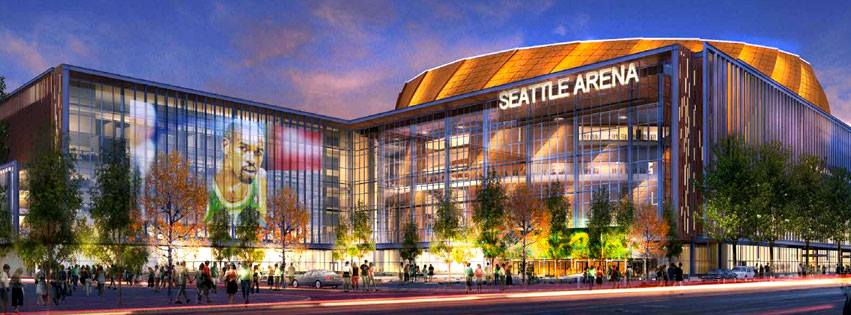- November 7, 2016
- Posted by: SportsV
- Categories: Home News, Industry News, News

SEATTLE (AP): The quest to bring the NBA back to Seattle took a significant step forward on Tuesday October 25, with investor Chris Hansen and his investment group offering to pay for a proposed arena with private funds.
In a letter to Seattle Mayor Ed Murray, the City Council and King County Executive Dow Constantine, Hansen’s group is now offering to rip up a memorandum of understanding from 2012 that called for up to US$200m in public investment in the arena.
Wally Walker, part of Hansen’s investment group, said:
We just concluded the landscape has changed. We can’t be ignorant of where we are four years in. If we think we can do this, then we should. Our priority is to get the arena because we think the NBA and NHL will come after that.
Hansen’s group is now offering to pay for the project privately. Additionally, the group is offering to contribute to a transportation project near the proposed arena that would help deal with freight traffic at the Port of Seattle, a sticking point in past efforts, in exchange for a waiver of the city’s admissions tax and an adjustment of the city’s business and occupation tax.
“We have concluded that a changed economic climate makes possible the private financing of the arena,” the letter reads. “For that reason, and to address concerns expressed by city council members, we would consider revising the street vacation petition to eliminate public financing of the arena. In such a case the MOU would be terminated and the rights and obligations of the parties under the MOU would end.”
The decision comes 5+ months after the city of Seattle turned down Hansen’s request to block off a street needed for construction of the arena, which could have led to the issuance of a master use permit, meaning construction of the arena could have started once an NBA team had been acquired.
Walker said:
Once we got through to the other side of the street vacation vote going unexpectedly, I think we stepped back rationally to look at what we could do to be put in a position so one, it could be passed, and two, meet the needs of the constituencies. We won’t meet all needs, but this is a great deal for the community. The previous MOU was as well, but this was better. We’re not over the hump yet because there are still politics involved, but we’re proud of taking this step. We did a fair amount of financial analysis, too, to make sure it would work and be a viable building for the community.
The termination of the MOU provides Hansen’s group with flexibility – should the city agree to its requests, which still include blocking off the street. Hansen already owns the land for the arena and could proceed with construction even without a team. It also opens up the NHL as an immediate possibility as the MOU was tied to the acquisition of an NBA team as a condition of construction.
Walker said the NBA was made aware of the decision to privately finance the project and of Tuesday’s announcement. He said:
We just wanted them to know what we were doing and they needed to be informed. And the NHL will be monitoring closely too, I’m sure.
Should the Arena plans progress, it can also be viewed as a win for politicians for pushing Hansen’s group to make the project privately funded.
Constantine said in a statement:
Chris Hansen today demonstrated his continued commitment to building an arena and to take advantage of an improving economy. His efforts will strengthen our ability to compete for an NBA team.
As of now, Hansen’s group – which includes members of the Nordstrom family and Walker, a former Seattle SuperSonics president and minority owner – has not taken on additional investors. The original proposal in 2012 said the total project would cost US$490m. Walker said the cost of the arena has likely gone up slightly from the initial projections.
Copyright 2016 The Associated Press. All rights reserved. This material may not be published, broadcast, rewritten or redistributed.
A statement on the Sonics Arena website, reads as follows:
Moving Forward
Following the Seattle City Council’s vote last May to deny the vacation of a portion of Occidental Avenue South we reiterated our commitment to bringing the NBA and NHL back to Seattle. We said we would take time to step back, evaluate our options, better understand the Council’s concerns and find a path forward.
For the past five months, we’ve been doing just that. We have carefully considered the various concerns expressed by Council members and identified steps we could take to address those concerns. In a letter to the Mayor and King County Executive — both of whom share our goal of bringing the Sonics and NHL back to Seattle — we described the steps we are willing to take to move the Arena project forward.
First, we will direct contributions to a package of additional SODO traffic improvements, which will improve freight mobility through the area. Second, we agreed to commit future payment of compensation for the vacated street to the city’s financing package for the Lander Street Overpass, thereby helping to close the funding gap for that important project. Finally, we have agreed to revising the street vacation petition to eliminate public financing of the Arena. Terminating the MOU would allow the city and county to recoup the US$200m in debt capacity and free-up Arena tax-generated revenue streams.
To make this all possible we have asked for approval of a revised conditional street vacation, a waiver of the city’s admissions tax, which has been granted for the other sports venues in Seattle, and an adjustment of the city’s B&O tax for revenue generated out of town.
We are hopeful these additional steps will address the concerns of the Council so the Arena project can move forward – which remains the critical first step to bringing the NBA and NHL back to Seattle.
Go Sonics!
— Chris Hansen, Erik Nordstrom, Pete Nordstrom, Wally Walker
About the Sonics Arena Project
The Sonics Arena Project is a public/private partnership (PPP) to build a world-class, multi-purpose sports and entertainment Arena in Seattle’s Stadium District. A majority of the investment is being made by private investors, and the project represents one of the largest private investments for an Arena project in North America.
The public consideration for the Arena plan is “self-financing,” as the debt service on the City and County’s US$200m contribution will be funded by tax collections that would not exist if the Arena were not built, and NBA and NHL teams were not returned to the market. Any shortfalls are paid and guaranteed by the private investors.
Unprecedented safeguards have been put in place to protect the City’s contribution and insure that taxpayer dollars are not at risk, and that even under the direst circumstances the City and County will be repaid in full.
In addition to bringing the NBA and Pro-Hockey back to Seattle, the project will make Seattle a preeminent concert destination, resulting in an increased number of world-class concerts and shows returning to Seattle.
Arena construction will create more than 2,000 sorely needed construction jobs, and the return of the NBA and NHL, along with increased concert activity, will drive additional economic benefits and tax collections for the City and County as patrons from outside Seattle and King County attend events at the Arena and spend money on related activities (dining, bars, hotels, souvenirs, etc).
But perhaps most importantly, the NBA and NHL will contribute in a meaningful way to Seattle’s unique community and culture. In addition to the civic pride, passion and sense of unity professional sports can bring to a community, the impact professional athletes can have on our underprivileged urban youth is perhaps most profound.
Project stats:
- The state-of-the-art Arena will include significant improvements to seating, AV, and load in and load out as compared to Key Arena, which would make it the premier concert venue in the Pacific Northwest.
- The largest portion of the US$490m cost comes from private investment, with the balance from City/County bonds that will be repaid solely by rent and tax revenue generated by the Arena – revenue that would not exist but for the existence of the Arena.
- Size: Approximately 700,000sqft
- Capacity: 18,500 attendees for NBA games, 17,500 for NHL games, 19,000 for concerts
- Investor Group guarantees to build the Arena to a stipulated level of design quality, including full capacity to host NBA and NHL teams as well as world-class touring acts.
Source: http://www.sonicsarena.com/

